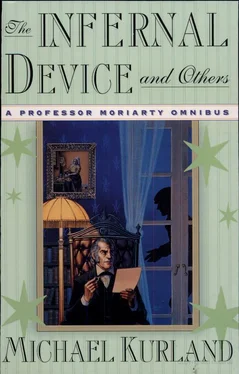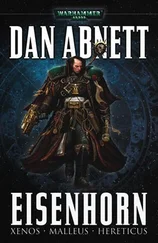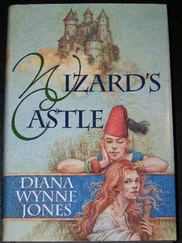"You know Inspector Lestrade, then. I was favorably impressed with him. He seems to have a good command of his job. Claimed to be running down several promising leads, although he was rather vague as to what they were. Said that he thought arresting the butlers would produce results."
"What sort of results?" Holmes inquired.
"He didn't say. He did say that he thought that bringing you in on the case was quite unnecessary, although he admitted that you've been of some help to the regular force in the past. 'Special circumstances,' he put it. If it weren't that the P.M. feels that a quite out of the ordinary finesse is required in this instance, the Home Secretary and I would feel quite sanguine in leaving the case in his hands."
"Normally he is quite adequate," Holmes agreed. "But then the usual case is just that — usual. A crime of brute force committed without forethought, requiring neither specialized knowledge nor ratiocination to solve."
"Faint praise indeed," Lord Arundale said. "Don't you think Lestrade is capable?"
"As a bulldog, yes. The man is tenacious, unrelenting, brave, honest, and loyal. But as a bloodhound, I'm afraid the more subtle odors of crime escape his nose."
Lord Arundale held out his teacup to be refilled. "That is basically what the Prime Minister said," he told Holmes. "The Home Secretary is convinced that the Metropolitan Police can, and should, handle the problem, but the P.M. felt that it might be too sensitive for the bulldog approach. And you came highly recommended by, if you will excuse my being vague, a member of the Royal Household."
Holmes nodded. "Please thank her majesty for me," he said. "I gather that it is this 'special circumstance,' of which I am as yet unaware, that makes these crimes sensitive and commends me to the attention of Lord Salisbury, the Prime Minister."
"True," Lord Arundale said. "The Marquess of Salisbury is indeed concerned over these murders. He is concerned, to be more precise, with whether or not he has cause to be concerned."
"I see." Holmes looked thoughtful for a moment. "Am I to understand that the crimes may have some political significance, but it is not known at present whether they actually do or not?"
"Yes," Lord Arundale said. "That, concisely, is it. The crimes may, indeed, be the work of a madman, or someone with a long-festering hatred for the four murdered men because of some secret grievance. But they may also be part of an intricate plot by any of three great European powers against her majesty's government. And we must learn which of these possibilities is the truth. And we must know as soon as we can; every day's delay could be disastrous."
"Four men?" Holmes asked. "I know of but three."
"Lord John Darby was found dead about three weeks ago," Lord Arundale said. He stared down at his teacup for a moment, and then drained it and returned it to the tray. "Lord John was the younger brother of the Earl of Moncreith."
"I remember noting it at the time," Holmes said. "But it was reported as a natural death. Heart attack, I believe the newspaper report said."
"Lord John was found on the dining-room table in his flat in Tattersham Court. His throat had been cut. A silver serving platter had been placed on the floor by the table to catch the blood."
"Come now, that is a fascinating detail!" Holmes said, stretching a lean arm out for the cigarette box on the mantel. "May I offer you a cigarette, my lord? They are of a Virginia tobacco, made for me by K. K. Tamourlane & Sons. The weed is noxious, but I find it sharpens the mental processes."
"No, thank you," Lord Arundale said. "But if you wouldn't object to the smell of a cigar—"
"Not at all." Holmes lit a taper from the gas mantle and applied it to the tip of his cigarette while Lord Arundale took a long dun-colored cigar from a tooled-leather case and went through the ritual of preparing it for the match. "Pray continue with your recitation of the strange death of Lord John Darby," Holmes said, lighting Lord Arundale's cigar before tossing the taper into the fireplace.
Lord Arundale took a deep puff. "I usually reserve these for after meals," he said. "Where was I? Oh, yes. Lord John was lying on the table — a great big thing, could easily seat twelve. French, I believe. Turn-of-the-century piece. His arms were spread out to the sides, but his fists were clenched. Interesting how one remembers all the small details."
"You saw the body, my lord?"
Lord Arundale stood and walked over to the bay window. Pulling the drape aside, he stared down at the traffic below. "I found the damn thing!" he told Holmes.
"How long would you say Lord John had been dead when you found him?"
Lord Arundale turned to look at Holmes. "I couldn't really say," he said. "Finding corpses is not really in my line, you see. For what it's worth, my impression was that the incident was fairly recent. The blood seemed to be quite fresh."
"Was anyone else there at the time?"
"Quimby, Lord John's valet. He let me in. This was about seven-thirty in the morning. He'd been there all night. His room is off the front hall."
"Had he seen or heard anything during the night?"
"Nothing. He let Lord John in late the night before. He's not sure of the time, but estimates it at shortly before two. Then he went to bed. He had not yet gone in to awaken Lord John when I arrived the next morning, having received no instructions on the matter."
"No other servants?"
"None present. There are a maid and a cook, but they live two flights up in the servants' quarters. The building of flats is designed with a common servants' quarters on the top floor."
"I see," Holmes said. "What sort of nighttime security is there in the building?"
"There is a hall porter on each floor all night, and a uniformed commissionaire at the front door. There are two other entrances to the building, but both are locked and bolted from the inside at eight o'clock."
Holmes reflected silently for a minute. "I am amazed," he said, "that Lestrade has not already arrested the valet."
"Quimby?" Lord Arundale asked. "You think he could be guilty?"
"Not for an instant," Holmes said. "I am, however, amazed that Lestrade shares my opinion."
"The Metropolitan Police have not, as yet, been informed of the crime," Lord Arundale said.
Holmes leaped to his feet. "What?" he cried. "You have concealed a murder from the authorities? Come now, sir. Even a peer of the realm cannot be allowed such liberty with the Queen's justice."
Lord Arundale held up a hand. "Pray calm yourself," he said. "The Prime Minister has been notified; the Home Secretary, who, as you know, is in charge of the Metropolitan Police, has been notified; the Lord High Chancellor has been notified; and her majesty has been told. I think you will have to admit that the formalities have been observed — perhaps on a higher level than is usual, that is all."
"I see," Holmes said, resuming his seat. "And why was this unusual procedure followed?"
Lord Arundale returned to the sofa. "I shall explain."
"You have my attention, my lord."
"I will have to give you the complete background. I arrived at Lord John's flat that morning to take him to a special emergency meeting of the Continental Policies Committee. This is a group of some twelve men who advise the Prime Minister on matters affecting Britain's relations with the great powers of Europe. Only issues of great and immediate concern are taken up by the committee, which is composed of the leading minds in the government. The very existence of this committee is a closely held secret."
"I was not aware of it," Holmes commented.
"Your brother, Mycroft, is a member," Lord Arundale told Holmes.
"He is very close-mouthed about his work," Holmes replied. "Just so," Lord Arundale said. "At any rate, Quimby asked me to wait while he awakened his master."
Читать дальше












